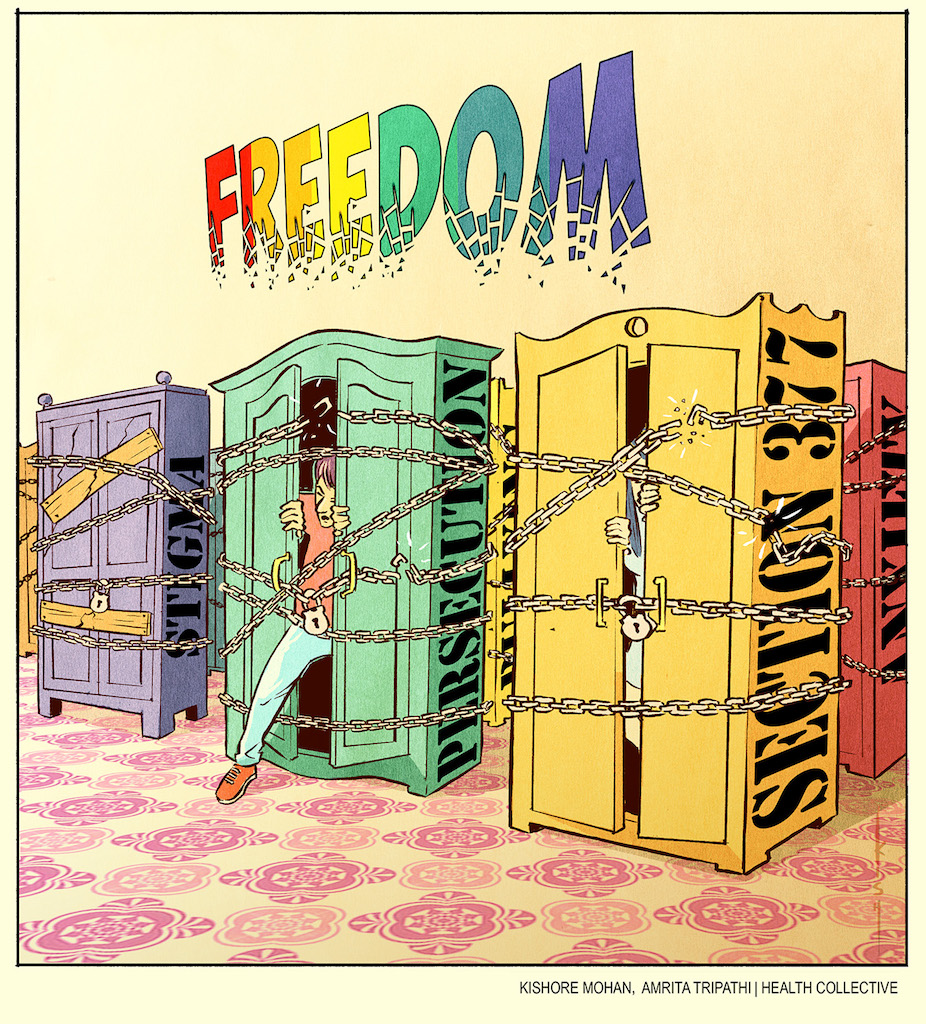Your Stories: Living With Bipolar Disorder (Part Two)
By @mariner1001
Our contributor @mariner1001 shares a second part to a blog on Living With Bipolar Disorder. You can read Part One of the blog here
Coping with Bipolar disorder has been a long struggle — the early period was one of extreme anguish and agony, but over time, I have learned to live with it and recognise the pressure points.
The last 1 year has been a period of relative stability and I find myself in a sort of extended mild depression, which I cope with by practising yoga (breathing techniques) and meditation, and minimal medication.
Before that, over a 5-year period it was different, intense, and distressing. Being a single parent added to the problem.
Manic phase:
I went on overdrive, (I was) hyperactive, verbose, and irritable and many other positive and negative characteristics. Complex problems seemed very easy to solve, and I performed at my best professionally during this phase.
The downside was an abrasive personality spouting rude comments, huge credit card bills because of expensive (and many times, inappropriate) gifts. Inappropriate behaviour with the opposite sex resulted in the ending of a very valued and cherished friendship. I developed illusions of grandeur. Fantasy and reality were mixed up, and many times, I was unable to distinguish between the two. Events that were firmly etched in my mind actually never occurred.
I would also pack my day with very hectic activity.
Getting up every morning at 4 am, going out for a jog, and then returning home to cook. Cooking became an obsession. Baking, too. Cakes, brownies, desserts, you name it. I would experiment with recipes. Vegetarian, non-vegetarian, salads, Mexican, Cajun, Chinese, Indian, traditional recipes from my ancestral town Mangalore. I also became a very good cook.
Despite the attendant problems, I sometimes feel the urge to relive my manic phase. It rather spiced up my life.
The manic phase did not last too long, and what I dreaded crept in – depression.
Depression: (AKA, Hell is what exists on earth; Heaven is where you go after you die)
This usually lasted for a longer period, sometimes running into several months. I was unable to get myself to interact with anyone, and it really affected my work and personal relationships. There were so many days when I just could not get myself out of bed the whole day. My absenteeism peaked, and I usually ended up into the “Leave without Pay” zone. Even when at work, I spent a lot of the time in the washroom, or the basement parking area, in my car. The reason was uncontrolled crying, for no rhyme or reason. When driving between home and office, I wore large dark glasses to hide the tears.
Loss of appetite resulted in rapid weight loss. In the past few years, my weight has fluctuated by almost 20 kilos back and forth. When driving alone in the car, I would play REALLY LOUD music. My hearing has suffered due to this, but it was a way of diverting my attention from bad, bad thoughts. Music by extremely loud rock bands became an escape route.
Suicidal tendencies were very strong in 2013, but after a botched attempt, I steered clear of that path.
Corrective action:
As I swung back and forth the between manic and depressed states, with some welcome and much required intervening periods of relative calm and “normal” state, I decided it was time to set things on a positive path. I started consulting a Psychiatrist. It was a major hurdle crossed, and though initially I attached an element of stigma to it, when I saw the long queue of persons outside the Doctor’s cubicle at Lilavati Hospital, I derived some vicarious comfort.
Medication:
I used to take medication concurrently to treat manic tendency as well as depression. The intention as stated by the Doctor, to maintain within a narrow band of behaviour. What happened was that I felt my mind was “compressed” in a forceful effort at regulating my behaviour. Although the medication somewhat controlled the symptoms of depression and manic behaviour, physically, I felt the expected problems of disturbed sleep, muscle cramps / failure (which required their own set of medication, and the list slowly grew longer).
The more worrisome aspect of such medication has been that it has reduced my cognitive and mental capability to a certain extent. I began realising that I was slowly losing my ability to think coherently and intelligently. I became unable to multi task, and that was when I stopped continuous and sustained heavy medication.
The Hermit:
Because of my erratic and unpredictable behaviour (both in manic as well as depressed phases), I have withdrawn from active social life, and have turned into a recluse now. I have been living in my apartment complex for the past 15 years, yet I know no other family even casually, let alone being close friends. It runs more than the usual “big city (Mumbai) aloofness”. It is a conscious effort to stay away from other people, and thereby, away from controversy. I am also more comfortable with it.
At work, I requested for a change in job profile, which does not involve a high level of networking and interaction with others. This is restricting my career progression. On the personal front, I have withdrawn from friends and extended family.
Alcohol:
Alcohol was my closest friend during my highs as well as lows, more so during the lows.
It started on weekends, but later became a daily routine habit, and an “escape route”.
Evenings at home were spent sitting in a darkened living room, no lights, with a drink in hand and I drank until I just went to sleep by passing out on the sofa. I was not setting a good example for my boys, and so one day, in a fit of pique, I poured two bottles of Scotch down the kitchen sink. It is a different matter that during the next weekend I got more booze. I recall one instance at home when my kids woke me up from my stupor and guided me to my bed, dribble running down my chin, and all.
Sometimes, I returned home late (and really drunk) after a party (industry get togethers where the liquor flows freely). I was extremely lucky I did not suffer an accident or be arrested for drunk driving. The next morning I would not remember how I got home (I used to drive home by myself). All I would remember was stopping frequently on the way to throw up on the roadside.
I finally got out of the cycle of constant drinking binges via a very simple strategy. I promised myself that I could have a drink only if someone else paid for it. Since that happens very rarely due to my reclusive life, it has been a very successful attempt, and my dark drinking days are past behind me now. I also avoid parties with (their) liberal flow of alcohol. In hindsight, drinking alcohol was just a crutch I used to divert my mind with, and it had no real benefit at all.
Rationalising:
Questions I have asked myself earlier – Why me? Why do I have this condition? Is it due to chemical imbalances in my brain? Did losing my young wife to cancer, and watching her painful and agonising suffering trigger the episodes? Is it hereditary? I know my father suffered from severe bipolar disorder, and with age, his condition became worse. I regret never having understood or sympathised with him for his state of mind, and I am thankful that my kids are very understanding about what I go through.
I no longer bother myself with such questions, as it does not help me in any way.
Seeking Happiness:
I derive most of my happy moments with my kids and they are a source of joy.
I have also developed a couple of new habits.
One, I have recently started on Twitter and Facebook, and that is where I find limited interaction with other people quite satisfying. I have control over the amount and frequency of interaction, so I am happy with that. Some old friends, relatives and acquaintances, and many new friends online, whom I have never met personally. They are all my online buddies.
The other new and positive habit I have developed is that of reading books. It started out as my New Year 2016 resolution, and I have managed to continue the habit. Fiction, Non Fiction, mainly contemporary Indian authors, several of whom I see and follow on Twitter.
It gives me something to do in my spare time, and keeps me occupied. It has also rekindled my thinking process.
Nitty Gritties:
I maintain mood charts, and track my feelings and state of mind in as statistical and quantifiable manner as possible. There are several tools and charts available online for this. It may not result in a “cure” (there is no “cure” in my opinion, there is only adjustment and improvement), but it will at least provide warning signals which can be used to administer some form of intervention.
Lessons learned:
The key to success in improving one’s life when faced with a mental health issue is to find one’s own solution. I am not saying that the solutions I have found for myself are right, or that they are applicable to other persons in a similar situation. What is important is that we should find comfort and relief for our own self in our own ways. Every human being is different, and a “one size fits all” approach does not work, in my humble opinion.
Another important thing to remember is – always share your thoughts and what you are going through with someone else – Doctor / spouse / parent / sibling / co-worker / friend / neighbour / any human being who is willing to listen and does not have a vested interest in your condition.
My “Bazinga!” moment occurred when I shared my thoughts on this blog earlier, and a kind soul on Twitter pinged me with the words “You are not alone!”
So very true!
So, start with that thought in mind!
I am very fortunate to have two wonderful kids (young adults now), a helpful elder sister, and an understanding boss at work. They have supported me in a million small ways, and helped me cope.
Look forward to something nice or exciting in the future:
I have a secret ambition, which I will share with you. A few years from now, when my kids have settled in their own lives, and once I stop working, I see myself buying a Harley and riding around all over India, taking in the sights and scenery. I hope this dream comes true, as I feel it will truly liberate me!
So, make some plans that you can look forward to; even if they do not all materialize, they will at least keep you in a positive frame of mind.
@mariner1001 earlier sailed as a captain in the merchant navy, and now works and lives in Mumbai.
**
NB: The Health Collective will always be a safe space for conversations and aims to be a community, but cannot substitute for psychological or psychiatric help. Please consult trained mental health experts if you or a loved one needs help






Pingback: Love, Understanding, and a Boyfriend with Bipolar Disorder